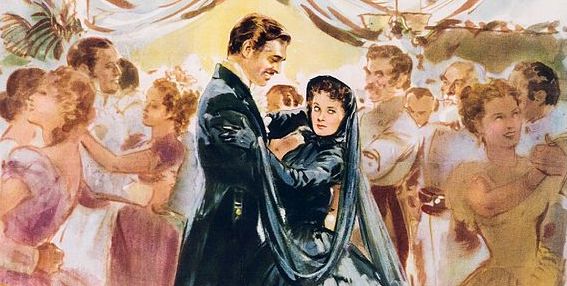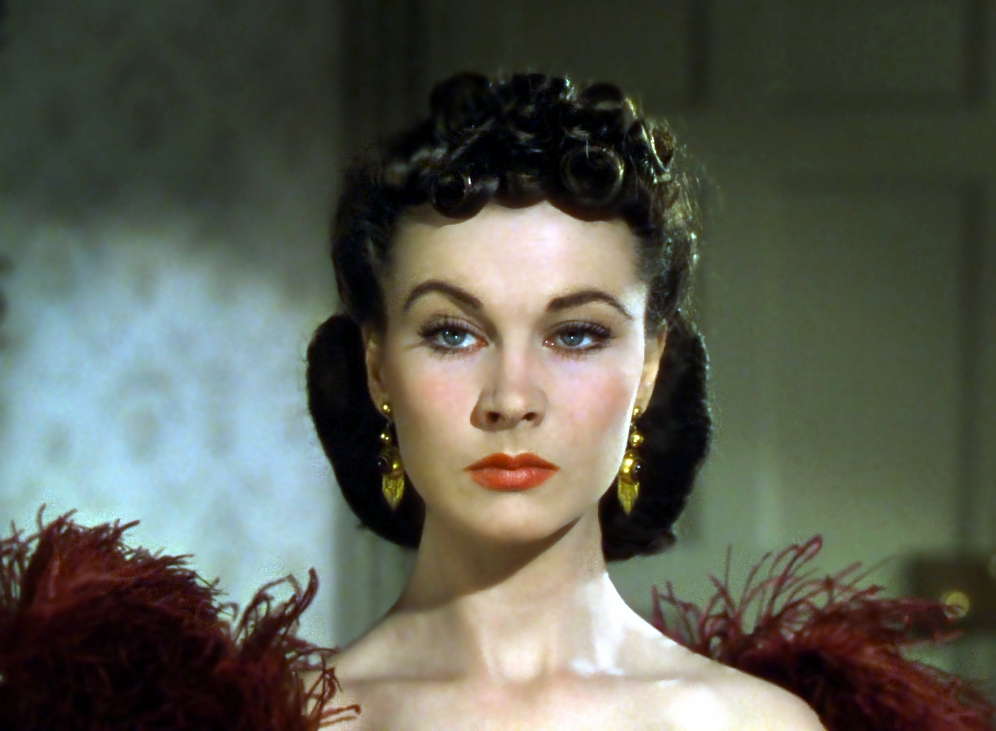
Churchill, Leslie Howard, Vivien Leigh and “Gone With the Wind”
Q: Did Churchill read Gone With the Wind?
“I am a longtime Gone With the Wind collector and researcher, and give presentations at GWtW events. I’ve also been the GWtW Answer Lady on several websites. Some asked: Did Churchill and Roosevelt read Gone With the Wind? It seems that FDR read quite a bit of the novel, but I couldn’t come up with anything about Churchill.
“I hope you don’t mind me tossing you this question. I assume that Churchill did see the film, as FDR did, on 26 December 1939, after it opened in Washington. Gone With the Wind opened in London on 18 April 1940.” —K.M., Royal Oak, Michigan

A: Yes; with several side stories….
On the contrary, your question sent me on an interesting dive through the archives to learn about a compelling story and one of Churchill’s favorite novels.
Leslie Howard’s misfortune: To start with a side note: Leslie Howard, who played Ashley Wilkes in Gone With the Wind, had a business manager, Alfred Chenhalls, who closely resembled Churchill, affecting similar clothing and a homburg hat.
Legend has it that German spies in Lisbon, observing Chenhalls and Howard boarding a flight to London, mistook them for Churchill and his bodyguard. They informed the Luftwaffe, who shot down the plane. Poor Ashley Wilkes, ever the loser.
The story is not verified, but Churchill heard the tale of mistaken identity. He found it ridiculous and telling. “The brutality of the Germans was only matched by the stupidity of their agents,” he wrote in his war memoirs.
Gone With the Wind

In the late 1930s everybody was reading Gone With the Wind, from my mother (I have her copy) to Neville Chamberlain. (His biographer, Keith Feiling, wrote that Chamberlain was “taking delight in it” during the Czech crisis in 1938.)
Winston Churchill was reading it as he wrote the American Civil War chapters of his History of the English-Speaking Peoples (not published until after the war). Thanks to Martin Gilbert’s biography we know quite a lot…
Winston S. Churchill to Brigadier-General Sir James Edmonds, a Civil War authority (Churchill Papers: 8/626), 24 March 1939:
When one comes to look at it en bloc, the Confederates never had any chance at all. It was only a question of the North getting under way and the amount of time required to destroy, if necessary, every living soul in the Confederate states.
The dramatic point is the wonderful resistance which they made…. Have you read Gone With the Wind? It is a terrific book.
It is interesting to re-read Churchill’s Civil War chapters in A History of the English-Speaking Peoples in the knowledge that he was reading Gone With the Wind as he wrote. Norman Rose stated:
A History of the English-Speaking Peoples is generally acknowledged to be the least satisfactory of [Churchill’s] books. It reads as a kind of pastiche that proclaims his “secular [Whig] faith,” its finest section (written as he read Gone With the Wind) telling the story of the American Civil War….
[But] the fact that Churchill was not a trained historian had its merits. As every scholar knows, in research it is necessary to be dogged in pursuit of sources, but also ruthless in sensing when to stop and to start writing. —Norman Rose, Churchill: An Unruly Life (New York: Simon & Schuster, 1994), 211
The Film

The 1939 film version also impressed Churchill. From the John Colville diary, 15 December 1940, Ditchley Park, Oxford:
We saw Gone With the Wind which lasted till 2.00 a.m. I thought the photography superb. The PM said he was “pulverised by the strength of their feelings and emotions.” —Martin Gilbert, The Churchill Documents, Vol. 15, Never Surrender, May 1940-December 1940 (Hillsdale College Press, 2011), 1241.
Sir Martin Gilbert adds:
On Sunday December 15, at Chequers, after watching the film Gone With The Wind, he had sat from two until three in the morning discussing the campaign in North Africa with Eden. As they talked, the total number of Italian prisoners of war captured by Wavell’s army reached 35,000. —Martin Gilbert, Winston S. Churchill, Vol. 6, Finest Hour 1939-1941 (Hillsdale College Press, 2011), 946.
The first time Churchill met Vivien Leigh he was rendered speechless by her beauty. This stemmed not only from her role as Scarlett O’Hara, but as Nelson’s “Lady Hamilton” (“That Hamilton Woman”)—beyond doubt his favorite film.
Following that film she married Laurence Olivier, whom Churchill had known since the 1920s. The Oliviers and Churchills were guests of each other. Alas we can only imagine their dinner table conversation.
Gone With the Wind in Churchill’s Pre-Munich speech…
Margaret Mitchell’s wonderful title inspired Churchill to use it twice. The march toward Munich in 1938 saw his first, highly effective application:
For five years I have talked to the House on these matters—not with very great success. I have watched this famous island descending incontinently, fecklessly, the stairway which leads to a dark gulf. It is a fine broad stairway at the beginning, but after a bit the carpet ends. A little farther on there are only flagstones, and a little farther on still these break beneath your feet….
If mortal catastrophe should overtake the British Nation and the British Empire, historians a thousand years hence will still be baffled by the mystery of our affairs. They will never understand how it was that a victorious nation, with everything in hand, suffered themselves to be brought low, and to cast away all that they had gained by measureless sacrifice and absolute victory —gone with the wind! —Winston S. Churchill, Arms and the Covenant (London: Harrap, 1938), 465: “The Danube Basin,” House of Commons, 4 March 1938.
In his memoirs…
…he summed up the results of Appeasement:
Look back and see what we had successively accepted or thrown away: a Germany disarmed by solemn treaty; a Germany rearmed in violation of a solemn treaty; air superiority or even air parity cast away; the Rhineland forcibly occupied and the Siegfried Line built or building; the Berlin-Rome Axis established; Austria devoured and digested by the Reich; Czechoslovakia deserted and ruined by the Munich Pact, its fortress line in German hands, its mighty arsenal of Skoda henceforward making munitions for the German armies…
…President Roosevelt’s effort to stabilise or bring to a head the European situation by the intervention of the United States waved aside with one hand, and Soviet Russia’s undoubted willingness to join the Western Powers and go all lengths to save Czechoslovakia ignored on the other; the services of thirty-five Czech divisions against the still unripened Germany Army cast away, when Great Britain could herself supply only two to strengthen the front in France; all gone with the wind. —Winston S. Churchill, The Second World War, vol. 2, Their Finest Hour (London: Cassell, 1949), 271
Postscript
 Minnie Churchill, Sir Winston’s grand-daughter-in-law, having read the above, offers another Churchill connection to Gone With the Wind, or at least Rhett Butler (Clark Gable). Here is Gable on bended knee with the then-Minnie d’Erlanger, on a date in Jamaica. “He was a complete gentleman.”
Minnie Churchill, Sir Winston’s grand-daughter-in-law, having read the above, offers another Churchill connection to Gone With the Wind, or at least Rhett Butler (Clark Gable). Here is Gable on bended knee with the then-Minnie d’Erlanger, on a date in Jamaica. “He was a complete gentleman.”






